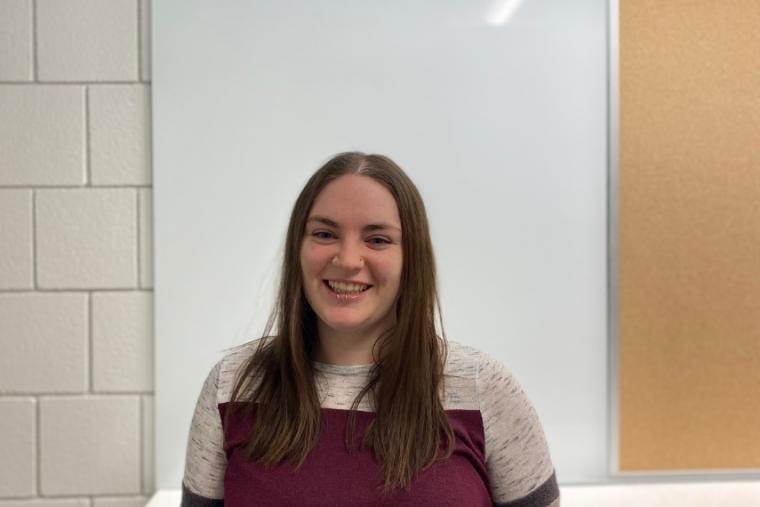
Almost 7 years ago, Gabriele Wehrle came to Guelph to start her Bachelor of Science degree in Biological & Pharmaceutical Chemistry. Today she is working on her Masters of Science underneath Professor Jennifer Murphy researching carbon-capture materials. Finding a home at U of G, Gabriele has always looked for ways to be involved with the on-campus community.
When Gabriele applied to universities, she knew she wanted to explore the province outside of her hometown of Ottawa, Ontario. After researching chemistry programs, she found Guelph, and quickly booked a campus tour. During her tour, she remembers experiencing the beauty of the campus for the first time, and said she really enjoyed the on-campus food as well.
Through her undergrad, Gabriele discovered a passion for the inorganic side of chemistry. This is why CHEM*2060 was one of her favourite courses, as it covered the applications of symmetry, simple crystal structures and principles of bonding. She also liked completing her fourth-year thesis project with Professor Marcel Schlaf [1]. “I really enjoyed getting to see what a professional lab environment was like” she said.
Through the University of Guelph’s Co-op program [2], Gabriele obtained valuable practical experience in labs, where she saw theory put into practice and used on a day-to-day basis. Two of her four co-op terms were through the Natural Sciences and Engineering Research Council of Canada’s (NSERC [3]) Undergraduate Student Research Award (USRA [4]) program, where she worked closely with Dr. Kathryn Preuss [5]. “I was able to explore different fields of chemistry throughout my co-ops, and the experiences I gained really opened up my mind to the idea of graduate school” she shared.

Since coming to the University of Guelph campus, Gabriele participated in several extra-curriculars, such as the U of G Outdoors Club [6], intramurals both as a player and a referee, and Supported Learning Groups (SLGs [7]). SLG’s are free group study sessions led by upper year undergraduate students and are meant to help those who are taking courses that are historically difficult with high drop/fail rates. Gabriele provided supplemental instruction through peer-to-peer teaching and believes it’s a great way for students of various comfort levels and abilities to collaborate towards a common goal. She was a leader for her first few years, co-facilitating the first online SLG at the start of the pandemic for BIOC*2580 before moving on to become a mentor in the program.
This upcoming summer, Gabriele is volunteering at North America’s largest conference for Chemistry educators, ChemEd2023 [8], which is happening right here at the University of Guelph! When she heard the call for volunteers, Gabriele was intrigued, wanting to learn more about the educational side of chemistry. As part of her role with ChemEd, she will be organizing make and takes, where educators get to create crafts and take part in activities. They then provide the resources for teachers to re-create the activities and do them with their own students.
Gabriele’s research focus for her MSc has kept her very busy. Here is a brief description from Gabriele on what exactly she’s been up to;
We are testing an existing group of polymers, previously only studied for their magnetic properties, for their ability to capture carbon dioxide from air. These polymers are easy to make and easy to tweak, and they include amines, a nitrogen-containing organic functional group that has been used in carbon dioxide capture for decades. The gist of it is that we are making and testing materials to capture carbon dioxide from the air.
Gabriele isn’t sure what’s next for her after graduation, but noted she would love to go further into academia and would aspire to have a strong balance between research and teaching.